Social Current is now accepting presentation proposals for its SPARK 2025 conference, to be held Oct. 20-21 in Chicago. This event will activate our collective power by sparking bold thinking and new conversations around some of our sector’s most vexing challenges. SPARK 2025 will offer a forum to connect, learn, refuel, and be inspired.
The deadline to submit presentations is Jan 28, 2025.
Social Current’s mission is to advocate for and implement equitable solutions through collaboration, innovation, federal public policy, and practice excellence. This conference will convene and unite a diverse community from across our network and sector to share their expertise and drive toward an equitable society where all people can thrive.
Proposal Guidelines and Deadlines
- All workshop proposals must be submitted through the online submission form by Jan. 28, 2025.
- All required information must be submitted for consideration.
- Proposed content should be appropriate for the 90-minute sessions. Participants prefer interactive sessions with clear takeaways and tools, rather than exclusively lecture.
- A maximum of three presenters/panelists is recommended.
- Workshops intended to sell a product, consultant, or program will not be considered.
- Submitting a proposal does not guarantee acceptance. Individuals will be notified by April 18, 2025 if their presentations have been selected for the SPARK 2025 program.
- Presenters are not paid for their participation but will receive a $75 discount on the conference registration rate.
Core Areas of Focus
Social Current welcomes presentations that will engage, challenge, educate, and inspire participants to act. While emphasis will be placed on the core areas below, we welcome submissions that address other current issues affecting and important to our sector.
Brain-Friendly and Trauma-Informed Approaches
Sessions should address the integration of brain-friendly, healing-centered, and trauma-informed knowledge, skills, and strategies into change efforts for programs, organizational culture, and/or systems. Consider topics that highlight how we apply brain-friendly and trauma-informed interventions to prevent toxic stress and increase positive experiences for children, families, social sector workforce, and communities. Suggested topics also include ways to merge brain-friendly and equity, diversity, and inclusion practices to strengthen our organizations.
Child, Family, and Community Well-Being
Sessions should describe innovative strategies for nurturing child and family well-being within communities, including efforts to transform child welfare systems into 21st-century child and family well-being systems, which involves but is not limited to child protective services. Consider proactive, public health approaches that address the social determinants of health, separate neglect from abuse, prioritize equitable solutions to better support families, and shift power toward families and communities and those with lived experience.
COA Accreditation
Sessions should discuss keys to achieving COA Accreditation and explore the immediate and ongoing benefits of accreditation on organizations, the workforce, and persons served. Consider topics such as the return on investment in COA Accreditation, the importance of using data and quality improvement processes to impact service delivery, how to engage your board and/or staff in the COA Accreditation process, ways to leverage your accreditation, and “best in class” examples of standard implementation.
Equity, Diversity, Inclusion
Sessions should address how to create just, fair, and inclusive organizational cultures and communities through policies, practices, and leadership, despite legal, political, and additional external factors that are challenging EDI efforts. Consider topics related to addressing inequity in health, education, wealth, systems involvement, and the workplace based on race, sexual orientation, age, gender, socio-economic status, and ability.
Government Affairs and Advocacy
Sessions should explore strategies to effect positive change locally, regionally, or nationally. We invite presentations that share insight on how to successfully influence policy, engage lawmakers, and mobilize grassroots efforts. These sessions will examine the intersection of public policy, community engagement, and social impact with the goal of creating a more just and equitable society.
Leadership and Organizational Development
Sessions should discuss leadership approaches, strategies, and frameworks for developing the next generation of social sector leaders so that they can address challenges and sustain success to achieve greater impact. Consider approaches that promote the skills needed to create and sustain equitable, inclusive, organizational cultures.
Submit your proposal through the online submission form by Jan. 28, 2025.
Social Current has recently received funding to support its work to further child, family, and community well-being. The organization will work in concert with partners and community-based organizations to provide training and technical assistance for the initiatives.
“Social Current has proven itself as a facilitator and training and technical assistance provider by creating access to experts, facilitating peer-to-peer learning, emphasizing lived experience, and supporting progress through research and evaluation,” said Jody Levison-Johnson, president and CEO. “We are proud to have been selected for these initiatives and look forward to advancing child, family, and community well-being so that all people can thrive.”
About the Initiatives
Quality Improvement Center on Helplines and Hotlines
Social Current and the Children’s Trust Fund Alliance are partnering with Evident Change, which has been awarded a five-year cooperative agreement with the Children’s Bureau, a division of the Administration for Children and Families (ACF), Administration on Children, Youth, and Families (ACYF).
The Quality Improvement Center on Helplines and Hotlines will be the resource for collecting and sharing national models and best practices in implementing community-based helplines as an alternative to child protective services (CPS) hotlines. The Center will also develop evidence-informed training for mandated reporters and hotline staff to learn skills to overcome bias in decision making and distinguish between poverty and willful neglect in child abuse reporting.
This project is supported by the Administration for Children and Families (ACF) of the United States (U.S.) Department of Health and Human Services (HHS) as part of a financial assistance award totaling $2,492,412 with 100 percent funded by ACF/HHS. The contents are those of the author(s) and do not necessarily represent the official views of, nor an endorsement, by ACF/HHS, or the U.S. Government. For more information, please visit the ACF website, Administrative and National Policy Requirements.
The Justice Initiative: Learning Network for Juvenile Justice Funding
Social Current is working with the National Partnership for Juvenile Services (NPJS) on this three-year initiative to enhance organizational capacity and resilience by increasing access to Office of Justice Programs (OJP) funding for community-based organizations serving youth in marginalized communities. This initiative focuses on organizations that provide juvenile justice services and victim services to individuals who face significant challenges, including racial bias and inadequate health care, which were exacerbated during the COVID-19 pandemic.
It will establish a learning network for 75 community-based organizations and impacted community members, with a focus on organizations that serve communities of color, indigenous and rural communities, persons with different abilities, and LGBTQ+ individuals. The initiative will provide training and technical assistance, focusing on the Extension for Community Healthcare Outcome model. Participants will learn from experts and each other to enhance the quality of services they provide and build skills to better access OJP funding.
This project is supported by cooperative agreement number 15PBJA-24-GK-04088-MUMU, awarded by the Bureau of Justice Assistance. The opinions, findings, and conclusions or recommendations expressed in this product are those of the contributors and do not necessarily represent the official position or policies of the U.S. Department of Justice.
OJJDP Building Local Continuums of Care to Support Youth Success
This initiative, awarded to JBS International in 2023, has received extended funding to enhance local continuums of care and opportunity. Social Current will collaborate with JBS and other project partners to respond to the training and technical assistance needs of communities. This initiative’s goals are to:
- Identify strategies that support promising and evidence-based approaches that advance the long-term well-being and success of youth and their families
- Develop economic impact strategies that result in cost savings, and identify how those cost savings can be reinvested into the larger continuum of care
- Establish a sustainable framework that supports the decarceration of youth and the diversion of children identified as being at risk of involvement in the criminal justice system through a coordinated, collaborative strategy and also promotes safe communities
Social Current will provide support to carry out training and technical assistance activities, including planning and coaching meetings; developing literature reviews, trainings, and tools; and more.
This project is supported by cooperative agreement number 15PJDP-23-GK-06136-JRIX, awarded by the Office of Juvenile Justice and Delinquency Prevention, Office of Justice Programs, U.S. Department of Justice. The opinions, findings, and conclusions or recommendations expressed in this product are those of the contributors and do not necessarily represent the official position or policies of the U.S. Department of Justice.
Learn more about Social Current’s Child, Family, and Community Well-Being Impact Area.
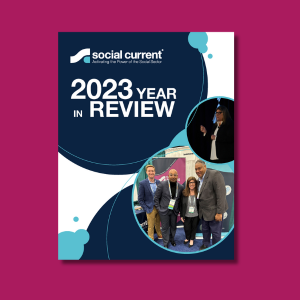
2023 set the stage for Social Current’s growing work to increase understanding, awareness, and respect for our sector and its myriad contributions. We were proud to announce our social impact campaign in partnership with UnCharitable and hold our first-ever Hill Day, recognizing the urgent need to dismantle barriers that obstruct our sector to effectively address pressing social issues. We are grateful to have your support as we continue to strengthen and amplify the work of the social sector to facilitate impact and systemic change through our core solutions and impact areas.
Our 2023 Year in Review features:
- A note from Social Current President and CEO Jody Levison-Johnson
- Engagement stats for our partnerships and service offerings: COA Accreditation; Engagement Packages, now Impact Partnerships; and Consulting
- Milestones related to our six core integrated impact areas
- Highlights of SPARK 2023 and Hill Day
Lardie to Lead Multi-Faceted Development Strategies Across Social and Human Services Funders and Foundations
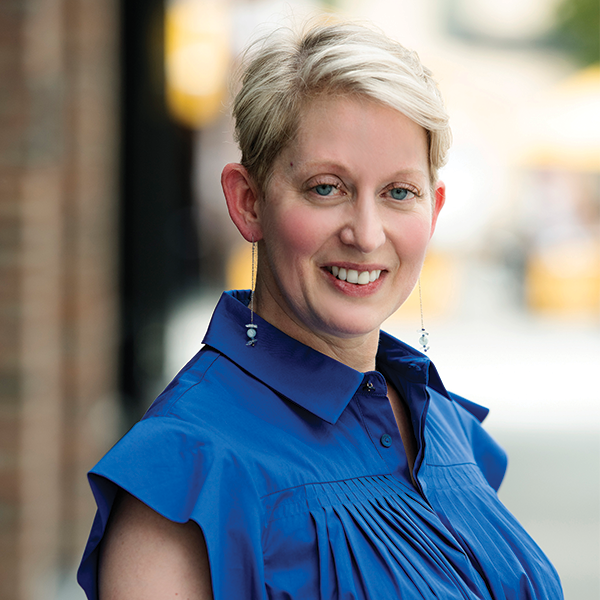
Social Current today announced that Sarah Beth Lardie has joined the organization as chief development officer to oversee and coordinate funding and development strategies across a broad range of social sector and human services funders and foundations.
With nearly two decades of experience in advancing the mission, vision, and goals of nonprofit organizations, Ms. Lardie has helped to lead the growth and sustainability of a wide range of successful organizations, raising more than $20 million dollars annually for civil society actors ranging from United Nations to local food banks. She began her career as a social worker working with children and families before transitioning to a career in development. As a member of the founding leadership team of Joshua Venture, a fellowship program for social entrepreneurs, she was responsible for providing fellowships for 16 entrepreneurs across the U.S. She has also been a mentor with MIT’s LaunchX program and an advisor to the African Venture Philanthropy Network.
“Sarah Beth’s extensive experience in development and her understanding and familiarity with the social sector as a social worker will help us grow our strategic partners across the sector,” noted Jody Levison-Johnson, president and CEO of Social Current. “She will be a critical asset in our efforts to activate the power of the social sector to help build an equitable society where all people can thrive.”
“Building civil society, bringing more people and resources to the critical work being done is fulfilling,” commented Sarah Beth Lardie. “Nonprofit organizations are where innovations to solve society’s most difficult problems are happening, and I love being part of that. That’s what drew me to Social Current.”
Lardie received her bachelor’s in sociology and labor studies from Rutgers University, her master’s in social work from the Columbia University School of Social Work and her master’s in public administration from Carnegie Mellon University/University of Pittsburgh in a dual degree program. She is based in New York City.
Social Current has selected Children & Families First Delaware (CFF) as the 2024 Innovative Impact Award winner for its Brain Science Training Institute (BSTI). The organization, based in Wilmington, Delaware, provides a continuum of child-centered and family-focused services throughout the state.
BSTI is a professional and organizational development program to embed brain science, trauma-informed principles, and related concepts into service delivery and staff, organizational, and community development. The institute is aimed at training internal staff to provide trauma-responsive care, and to help other organizations in the state and country begin their trauma-informed care journey.
CFF began by training all staff in trauma-informed care, brain science, resilience, and self-care. Its internal trainers provide quarterly training to all new staff in the foundational principles of brain science and trauma-informed care, as well as provide regular retraining and advanced training to all CFF staff. In preparing to offer training and consultation externally, the organization began building capacity of internal trainers to provide foundational training and advanced training modules.
“I am thrilled to recognize CFF for their work to accelerate the adoption of brain science within the human services sector and beyond,” says Jody Levison-Johnson, president and CEO of Social Current. “We know that applying trauma-informed approaches is critical for healthy child development and workforce resilience, and CFF is at the forefront of this innovative work.”
Since inception in 2020, BSTI has trained more than 1,500 individuals, including K-12 educators, early childhood providers, child-welfare professionals, law enforcement, social services providers, and victim service advocates.
BSTI conducts post evaluations of the training provided to agencies. Most attendees include educators and school staff (39%) and human services and mental health professionals (32%). Across 10 questions on the understanding of trauma and toxic stress and methods to promote resilience and reduce compassion fatigue, 92% of participants in 2022 and 2023 felt they strongly agreed or agreed. In addition, 99% of participants felt they could apply the skills and information learned to their professional work and personal goals.
Video Interview with CFF
In this video interview with Karen Johnson of Social Current, Shannon Fisch and Kiera McGillivray, who co-lead the BSTI at CFF, discuss its impact on their organization and how they’ve been able to support other community organizations in embracing brain science.
Learn More at SPARK 2024
CFF will be recognized at the SPARK 2024 conference, Oct. 21-22 in Denver, and staff will share their expertise in their workshop on trauma-informed performance management.
Brain Science and Trauma-Informed Approaches is an area of focus for SPARK 2024 workshops. Other sessions in this focus area address creating a healing-oriented culture, somatic and embodied approaches, nature-connected wellness, and employee engagement.
Register for SPARK 2024 by Sept. 20 to receive the early bird rate.
People with intellectual disabilities and their families disproportionately experience poverty and economic instability. However, community-based organizations can play an important role in promoting independence and well-being through financial literacy education.
To help organizations teach spending and saving basics to individuals with intellectual disabilities, Bank of America has developed two sets of Better Money Habits® tools. These free tools can be incorporated into existing programming and include presentations, resources, videos, and more. Choose from the various tools to customize the learning to your specific audience, amount of time, and type of program or event.
Getting Started: Learn How to Use the Better Money Habits® Tools
Social Current and Bank of America have prepared an on-demand train-the-trainer series to introduce the tools to program staff at community-based organizations. The videos offer best practices and tips for using the resources and delivering the lessons.
The series is free and available to everyone. Just log in or create an account to enroll.
Learn more and access the train-the-trainer series.
After watching the train-the-trainer videos, download the Better Money Habits® tools from Bank of America. These tools were developed in cooperation with the National Disability Institute as well as the Special Olympics.
Social Current’s Knowledge and Insights Center is now offering access to the Next Big Idea Club. This virtual book club, curated by bestselling authors Malcolm Gladwell, Adam Grant, Susan Cain, and Daniel Pink, delivers the most important nonfiction books of the year. Through our online forum, you can dive deep into impactful ideas with 45-minute audio and video lessons. These lessons distill the essence of groundbreaking books, offering you a comprehensive understanding in a fraction of the time.
Social Current’s access includes highlights from the Next Big Idea Club’s collection of books, with a particular emphasis on:
- Workplace relationships
- Workforce resilience
- Improved communication and interpersonal connection
- Authentic approaches to diversity, equity, inclusion, and belonging
In this forum, featuring lessons from the books below, you’ll learn strategies and techniques that improve relationships with coworkers, clients, community members, and partners, in addition to your personal relationships away from work.
- High Conflict: Why We Get Trapped in Conflict and How We Get Out by Amanda Ripley
- Uncensored: My Life and Uncomfortable Conversations at the Intersection of Black and White America by Zachary Wood
- You’re Not Listening: What You’re Missing and Why It Matters by Kate Muphy
- No Hard Feelings: The Secret Power of Embracing Emotions at Work by Liz Fosslien and Mollie West Duffy
Access to the Next Big Idea Club is an exclusive benefit for Social Current Impact Partners.
Learn more about the benefits of becoming an Impact Partner online and by joining an upcoming informational webinar.
How to Access
Go to Next Big Idea Club: Better Relationships In and Out of the Workplace.
Social Current Impact Partners can access these lessons for free by logging into the hub. Log in to your existing account or create one if you are a new user. Once logged in, check out the resources list and click on the individual records to view.
Learn more about the Social Current Knowledge and Insights Center.
At Social Current’s SPARK 2023 conference last October, I announced our New Narrative campaign and shared that Social Current would be collaborating on the social impact campaign for the film UnCharitable. After months of planning and conversations with our UnCharitable colleagues, I am excited to announce that Social Current will be the catalyst, convener, and activator on the social impact campaign for UnCharitable.
While ideas are still taking shape, we are excited that, together with the UnCharitable team, we will be working to solidify funding and identify an initial cohort of communities to create, test, and refine strategies to change the perception and fundamentally redefine the nonprofit sector and its ability to solve social problems.
We will be sharing more details in the coming months and at SPARK 2024 in Denver this October and are excited about the future opportunities for you and your organizations to be part of this important work.
The important work of creating an equitable society where all people can thrive cannot be achieved without the support of diverse community-based partnerships. Global Volunteer Month, celebrated in April, provides a great opportunity to acknowledge and celebrate partners that donate time, resources, and expertise to make a difference in our communities.
Social Current is grateful for its corporate social responsibility partners, which bolster our network’s impact by engaging teams of corporate volunteers and generously donating resources.
Aramark
Social Current is grateful for our 16-year partnership with Aramark. Rooted in service and united by purpose, Aramark strives to do great things for its employees, partners, communities, and planet. Their global volunteer program, Aramark Building Community, engages the talents and passions of employees to develop solutions that address challenges caused by lack of access to healthy food and proper nutrition, financial insecurity, and inequitable environments. The program drives stronger communities, creates employee volunteer opportunities, and encourages employees to give back to their local communities.
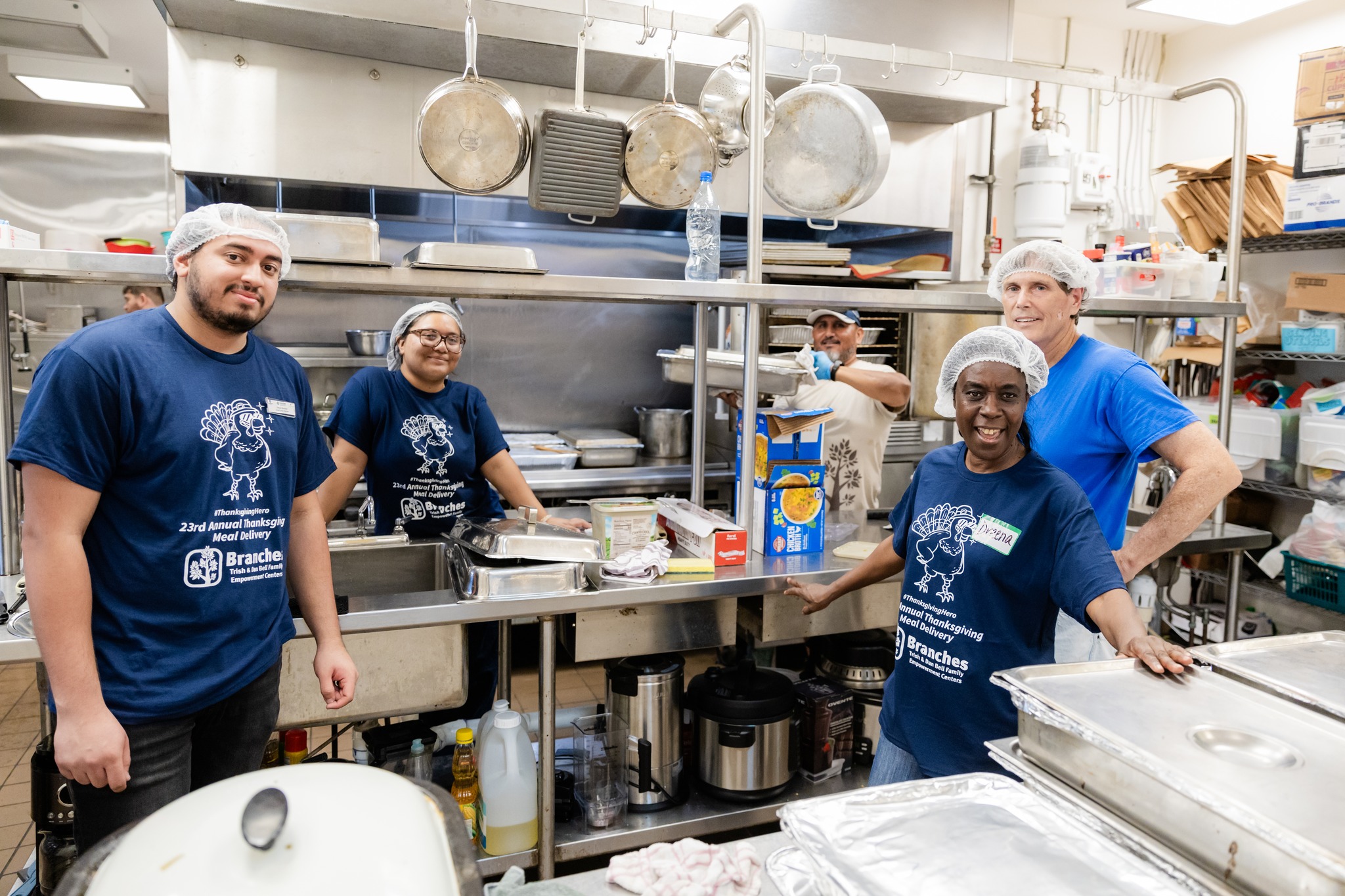 The Aramark Building Community grant program and team of engaged volunteers have been an incredible support for Social Current partner Branches in Miami, especially over the holidays. Aramark volunteers cooked, packaged, and delivered meals over Thanksgiving, while also purchasing and wrapping gifts for college students during the holidays.
The Aramark Building Community grant program and team of engaged volunteers have been an incredible support for Social Current partner Branches in Miami, especially over the holidays. Aramark volunteers cooked, packaged, and delivered meals over Thanksgiving, while also purchasing and wrapping gifts for college students during the holidays.
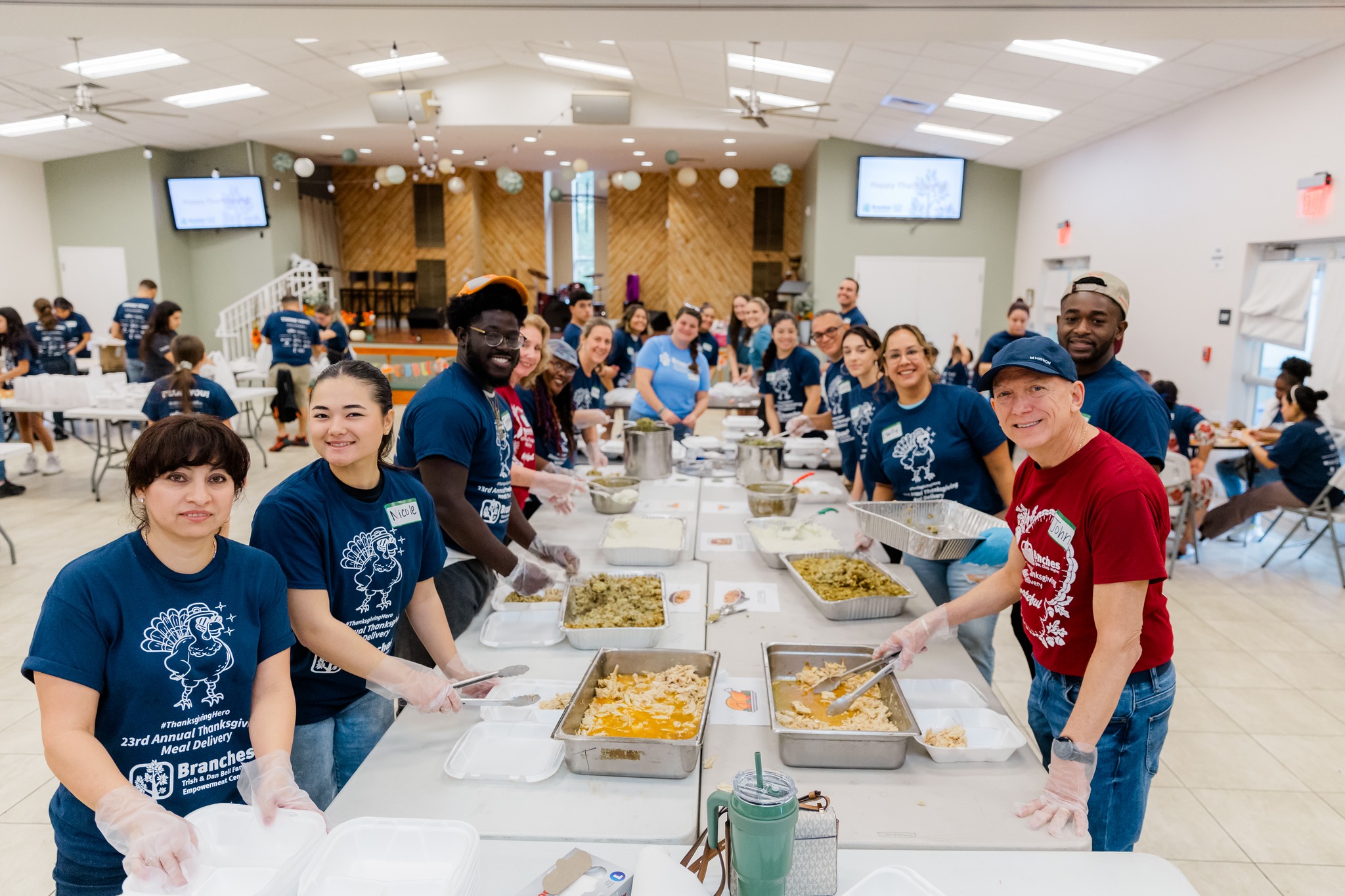 “We are continually grateful for the service-minded spirit of Aramark volunteers,” said Sarah Pattinson, associate director of development at Branches. “They come ready to serve the community and to tackle any project we present them with. They serve with joy and are always willing to go above and beyond for others.”
“We are continually grateful for the service-minded spirit of Aramark volunteers,” said Sarah Pattinson, associate director of development at Branches. “They come ready to serve the community and to tackle any project we present them with. They serve with joy and are always willing to go above and beyond for others.”
CSC ServiceWorks
Since 2021, Social Current has partnered with CSC ServiceWorks, the leading provider of laundry solutions and air vending services throughout the U.S., Canada, and Europe.
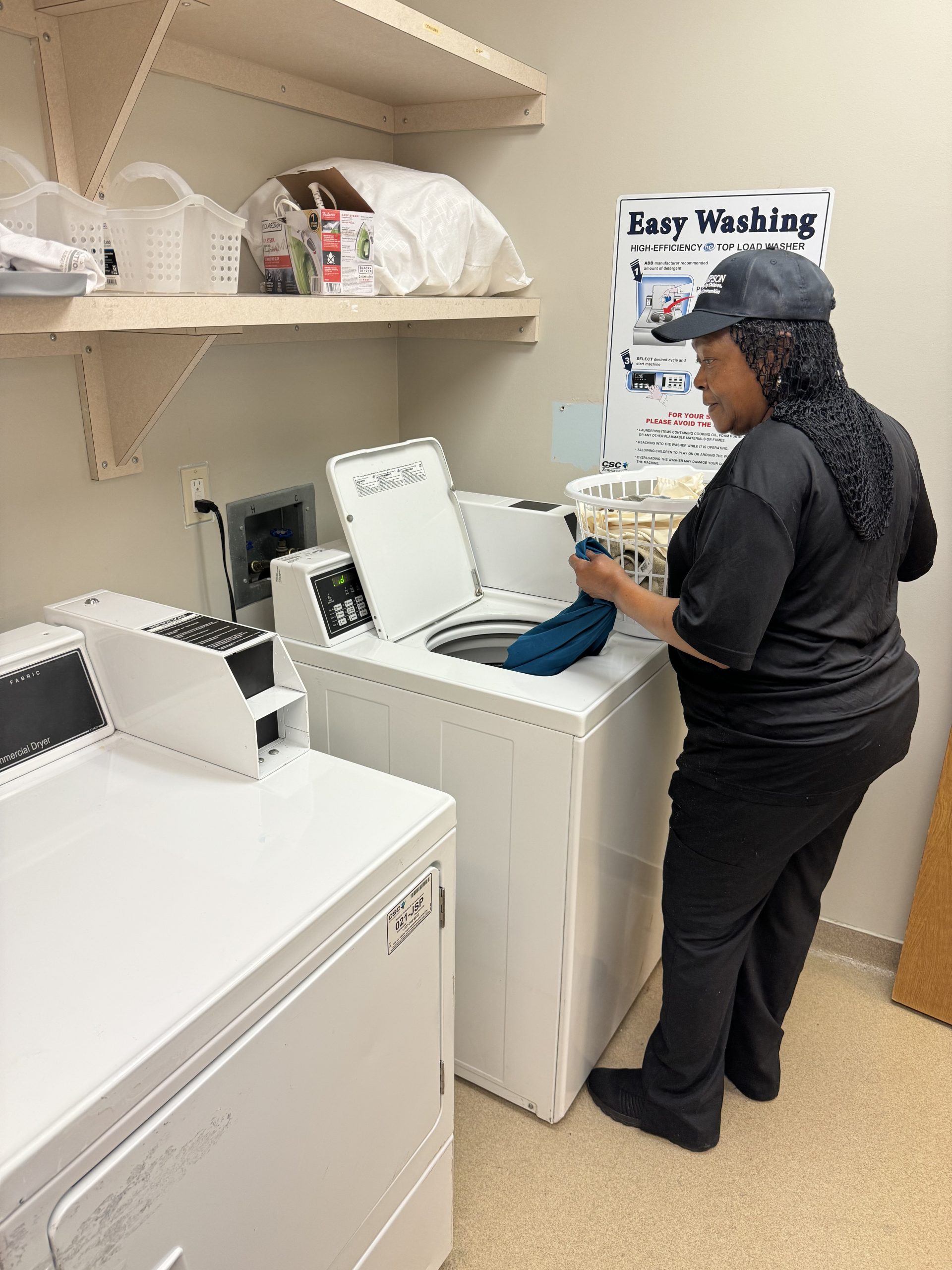 CSC CommunityWorks’ Signature Services program works with community organizations to provide reliable access to clean laundry and basic supports. They believe access to clean laundry is essential to helping people be successful in school and work as well as to maintain healthy lifestyles. CSC teams support their local community-based organizations by providing washer, dryer, air, and vacuum equipment; ongoing service for these machines; and volunteer support. Through their donations of washers, dryers, and ongoing equipment maintenance, CSC helps strengthen the capacity of Social Current partners who are providing essential services.
CSC CommunityWorks’ Signature Services program works with community organizations to provide reliable access to clean laundry and basic supports. They believe access to clean laundry is essential to helping people be successful in school and work as well as to maintain healthy lifestyles. CSC teams support their local community-based organizations by providing washer, dryer, air, and vacuum equipment; ongoing service for these machines; and volunteer support. Through their donations of washers, dryers, and ongoing equipment maintenance, CSC helps strengthen the capacity of Social Current partners who are providing essential services.
“The equipment [provided by CSC ServiceWorks] has allowed us to keep our laundry done in a timely fashion because our machines stay in operation,” said Danny Whitley, chief facilities officer at Thompson Child and Family Focus in Matthews, North Carolina. “We are 24/7 facility, and laundry is crucial to our care.”
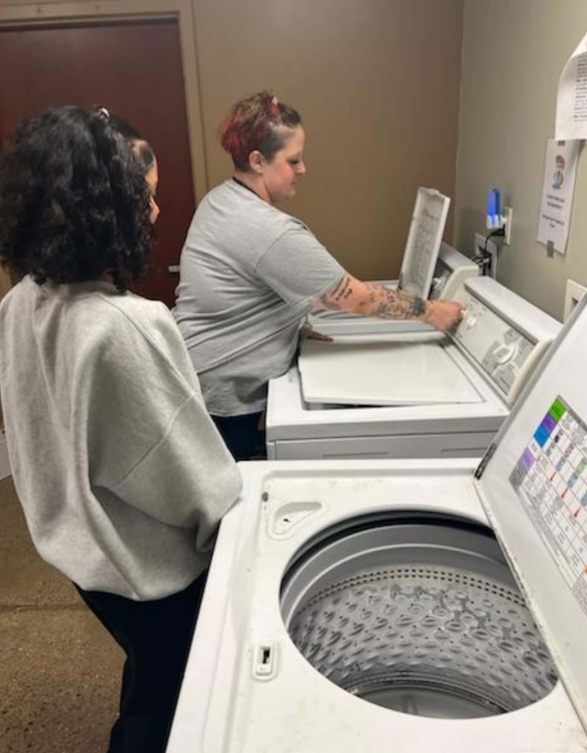 Rodney Prystash, director of facilities/operations at Auberle in McKeesport, Pennsylvania, shared, “The six high-quality washer and dryer units provided by CSC ServiceWorks have really helped meet the need for families residing at our homeless family shelters, and for the young women and men at our semi-independent living programs. The donated equipment and volunteer installations have allowed us to use resources for other critical items for those that we serve.”
Rodney Prystash, director of facilities/operations at Auberle in McKeesport, Pennsylvania, shared, “The six high-quality washer and dryer units provided by CSC ServiceWorks have really helped meet the need for families residing at our homeless family shelters, and for the young women and men at our semi-independent living programs. The donated equipment and volunteer installations have allowed us to use resources for other critical items for those that we serve.”
Social Current celebrates and thanks all of its corporate volunteers, working in partnership with our network of organizations and helping us implement equitable solutions to society’s toughest challenges. For questions about Social Current’s corporate partnerships, please contact Emily Merritt, senior manager of corporate partnerships.
Lauri Goldkind, associate professor at Fordham University, will lead a session on artificial intelligence (AI) in human services at the upcoming CEO Convening, May 1-3 in Detroit. During the session, she’ll help participants assess opportunities and challenges related to using AI in human services organizations. This rapidly developing technology holds promising benefits for greater efficiency and effectiveness; however, it must be implemented strategically. Participants will be introduced to the three main applications of generative AI, learn how to conduct an organizational readiness assessment, and consider the elements of an organizational AI policy.
Goldkind’s research interests include data justice, AI and data ecosystems in nonprofit management, and telemental health and human rights. She has coauthored two articles for Social Current’s journal, Families in Society: The Journal of Contemporary Social Services. The journal offers peer-reviewed content that continually advances the social work profession.
“That’s the Beauty of It”: Practitioners Describe the Affordances of Direct-to-Consumer Tele-Mental Health
Lauri Goldkind and Lea Wolf
Published 2021, Vol. 102 (Issue 4)
This qualitative study uses the framework of affordances, derived from James Jerome Gibson, to examine what social work practitioners working on direct-to-consumer tele-mental health (DTCTMH) platforms are discovering about the features, benefits, and constraints of virtual therapy.
An interpretive phenomenological approach was employed to document the lived experiences of social workers who practice in this manner. According to the practitioners interviewed, for a subset of individuals seeking treatment, DTCTMH can offer meaningful interpersonal interaction that confers benefit. Key affordances include accessibility, anonymity, meaningful work, autonomy, lifelong learning, and access by new populations. Practitioners simultaneously acknowledge the ethical complexities and structural challenges of DTCTMH practice. The article concludes with suggestions for future research, policy, and practice.
Selling Your Soul on the Information Superhighway: Consenting to Services in Direct-to-Consumer Tele-Mental Health
Lauri Goldkind and Lea Wolf
Published 2020, Vol. 101 (Issue 1)
The practice of on-demand digital psychotherapy presents ethical questions, as new economic models, service delivery systems, and therapeutic models are introduced. Virtual therapy, now offered on a subscription basis by third-party providers, requires users to accept terms of service (ToS) agreements.
This article describes the results of a survey in which participants (n = 579) were asked to compare the values of the Human Rights framework with the language of one tele-mental health platform’s ToS user agreement. Findings suggest that those clients with prior experience with a mental health professional will find the ToS agreements to be the most ethically compromised. Similarly, individuals who are employed and have attained a higher level of education also found the ToS to be ethically suspect. Of those who were surveyed, individuals who hold less education and those who are unemployed, may be at most risk for signing consent to a system they do not understand. The study provides one example of the ethical questions that emerge from the introduction of a new model of for-profit service provision in mental health. Recommendations for consumers and practitioners are suggested.
How to Gain Access to Social Work Research
Social Current’s Knowledge and Insights Center offers the research and resources human services professionals need to stay current on emerging trends, implement practices, and advance organizational excellence. One feature of the Knowledge and Insights Center is the complete collection of Families in Society journal content, dating back to 1920.
In addition, users have access to an extensive resource library with thousands of catalog records in more than 20 topic collections, EBSCOhost, and customized research requests with knowledgeable librarians.
The Knowledge and Insights Center is one of the many benefits of being a Social Current Impact Partner. Other benefits include convenings and networking opportunities, complimentary participation in our workforce resilience virtual learning series, and special cost savings on solutions from Social Current and our Strategic Industry Partners.
Organizations may also purchase access to the Knowledge and Insights Center.

